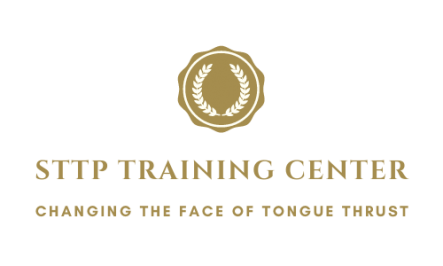I am frequently asked about what can be done with the tongue thrust kiddos who are under the age of intervention for the Stone Tongue Thrust Protocol (STTP) because they don’t have the awareness and attention to actively participate in the intensive remediation program. Should you ignore it? Wait for 8?

Maybe you are in the school setting and the tongue thrust does not have an educational impact and therefore can not be directly addressed on the IEP. What then? Can you ignore it?
I say no to all of the above. Ethically can you ignore a disorder if you know it is having a detrimental impact and can be eliminated? I can’t.
So what does a clinician do in these situations? I recommend foundational training and/or referral. As the clinician it is your responsibility to educate the parents about the potential impact of tongue thrust and the appropriate remediation options given the child’s age and circumstance. Of course, in order to do that YOU need to have an understanding of tongue thrust and appropriate remediation options. The StoneTongueThrustProtocol.com website is a great place to start with educational blogs and courses to help educate both clinicians and families about what tongue thrust is (and isn’t) and where to go from there.
While you are “waiting” to eliminate the tongue thrust there are several things that will set them up for great success early on.
- I already mentioned the first and I think most important…educate about tongue thrust at a level that is appropriate.
- Eliminate oral habits
- Eliminate contributing factors such as airway or sinus issues (refer to appropriate professional)
- Engage the base of tongue
- Address developmentally appropriate articulation issues
I am almost positive that no matter the age of the child, if they are on your radar now for tongue thrust but they are not ready for tongue thrust elimination, at least one or more of the above will be appropriate. So how do you know? Use your clinical judgment. If you feel like you need some skill training to improve clinical judgment then please consider the STTP Certification Course.
The skills you learn and the clinical insight all develop your clinical judgment that carries over throughout your caseload. Whether it’s pediatric dysphagia/feeding issues in medical settings or developmental articulation in school settings, I get feedback from certified clinicians that this coursework has changed the way they practice.

I’m being asked more about the impact of oral habits on tongue thrust. The thumb sucking and extended pacifier use are widely accepted as contributing factors for potential tongue thrust. School SLPs have mentioned to me that they have an increase of frontal /s/ productions on their caseloads. I don’t believe we have any hard evidence (this would be a great research study for my University colleagues) but we certainly do have an increase of water bottles, sippy cups, food in pouches and tubes, etc. that encourage the ongoing “suckling pattern” of the tongue with forward and depressed placement. Does our convenience, no mess, on the go lifestyle lend itself to developing a reverse swallow or tongue thrust? I don’t know for sure but it is an interesting observation.
I’m anxious to hear your thoughts and ideas of managing tongue thrust and setting the stage for effective elimination when it is developmentally appropriate. What do you do in your setting? What are the barriers? What are the successes?
Join the conversation and help us change the face of tongue thrust! Breaking down misconceptions and barriers is the beginning. Use our resources and join our classes to make a difference in your caseload management and clinical judgment today!





